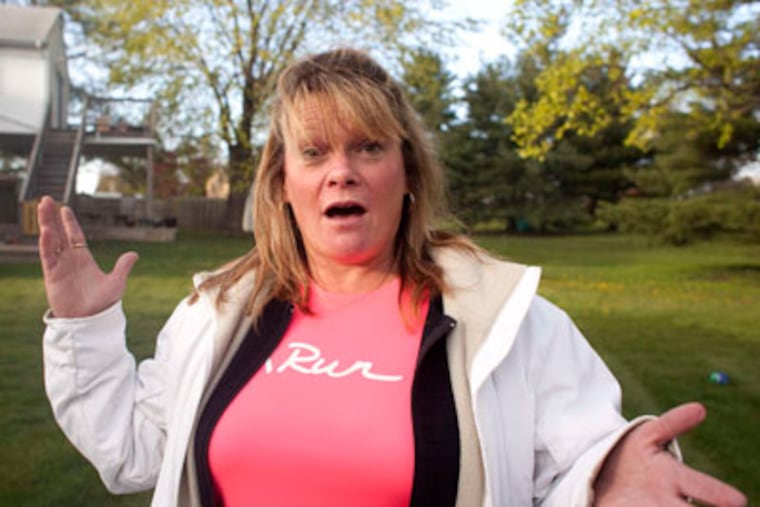For Montco woman with allergy, neighbor's beekeeping is a health issue
Trish McArthur is so allergic to bee stings that when she heard two hives had joined her densely populated Plymouth Township development, she freaked out.

Trish McArthur is so allergic to bee stings that when she heard two hives had joined her densely populated Plymouth Township development, she freaked out.
"I understand honeybees may be great for the environment, but they don't have to be in our backyards," she said in a flier she distributed to neighbors. "Rent some space on an open field if you are that passionate about beekeeping."
In just over a week, 50 residents rallied behind McArthur, telling local officials they feared for the safety and health of those living near the hives and asking that beekeeping be banned on properties smaller than an acre in the Montgomery County community.
At the center of the ruckus are Kevin and Colleen Schaffer, who installed the hives this spring on a second-floor deck behind their home on Sandwood Road, four doors from McArthur's house.
Declining an interview, the Schaffers instead issued a statement last week, saying, "Our intention in keeping honeybees is to positively affect the environment." They wrote that having followed experts' advice and Pennsylvania Department of Agriculture recommendations, "we meet all requirements for safe honeybee-keeping."
What's going on at the Schaffers' is just part of the growing buzz nationwide. As a mysterious colony collapse disorder has decimated the honeybee population, the ranks of backyard dabblers have swelled. As many as 80 percent of the 2,600 registered beekeepers in Pennsylvania last year were thought to be hobbyists.
Michelle Obama has a hive on the White House south lawn next to her vegetable garden, according to a bee journal. Two years ago, the New York City Board of Health lifted its ban on beekeeping, giving rise to rooftop hives in all five boroughs.
NIMBY disputes are bound to erupt. And when they do, as in Plymouth Township, aficionados and amateurs alike are prepared to mount a vigorous defense of the genus Apis.
In a letter to McArthur, James Bobb, past president of the Montgomery County Beekeepers Association, assured that bees want only "to collect nectar and pollen from flowers, and if we ignore them, they will completely ignore all of us in that pursuit."
What McArthur does know is this: The Schaffers "decided to pick a hobby that stings," and as a result, "my quality of life is changing."
A married mother of two, McArthur, 48, goes nowhere without an EpiPen, which delivers a lifesaving shot of epinephrine. In 1992, she had such a severe reaction to a bee sting in Conshohocken that her toes swelled and turned blue. Had she not sought prompt treatment, her doctor said, she might have lost them.
McArthur said she already had seen dozens of bees working her yard - well within their five-mile flight path.
To put it bluntly, "You don't want my dog crapping on your lawn," she said. "I don't want your bees on my property."
Nationwide, 2 percent of U.S. adults and less than 0.5 percent of children are at risk for insect-sting anaphylaxis, a dangerous allergic reaction that can interfere with breathing. Each year, 40 people die, mainly from yellow jacket, hornet, and wasp stings. The number of deaths from honeybee stings is unknown.
Insect-sting anaphylaxis is far less common in children than a peanut allergy, said David B.K. Golden, associate professor of medicine at the Johns Hopkins University School of Medicine, who has a career-long interest in severe reactions to insect stings.
"I can well understand [McArthur's] concern," he said. "But the best thing she could do is to be fully protected, and usually cured, by a program of allergy shots - bee venom immunotherapy - to build a resistance."
Honeybees are docile and sting only "when you disturb their hive or crush them," said longtime beekeeper Charles Breinig, who has argued the Schaffers' case before Plymouth Township officials.
"They are not like yellow jackets or wasps, which will sting you multiple times," he said. "When honeybees sting, they die. So they are genetically predisposed to only sting as a matter of last resort."
Plymouth Township initially rejected the Schaffers' request to keep bees because a zoning law prohibited "harboring insects."
That changed when township officials reinterpreted beekeeping as an agricultural endeavor, the couple wrote in a beekeepers' newsletter.
McArthur was peeved. "They put the beehives out on a Sunday. No one was told," she said. "They found a loophole in the law."
Plymouth Township's governing council held a public meeting on the issue April 9. It was packed with beekeepers and McArthur's neighbors. The panel took no action and did not indicate when it would rule.
"Council is investigating whether it has the power to regulate this activity, and, if so, it will determine the best way to deal with this activity," Township Manager Karen B. Weiss said.
Leo Donovall, chief apiarist in the state Agriculture Department, said other townships had debated whether to restrict or even outlaw beekeeping, "though the vast majority of local authorities do not strongly approve or disapprove of beekeeping."
Only three Pennsylvania municipalities have declared themselves "no buzz zones," according to Kim Flottum, editor of Bee Culture magazine: Elizabethtown in Lancaster County, Bethlehem in Lehigh County, and Silver Spring Township in Cumberland County.
McArthur is determined that Plymouth Township must clamp down by at least restricting beekeeping to large properties - larger than the 1/8- to 1/4-acre tracts in her neighborhood.
She said she counted as many as 100 bees near her house on a recent sunny day. She expects more bees, and children, in her yard this summer.
"In June, am I going to have 100, 1,000 bees?" she asked. "If bees become a nuisance, who do I go to?"
at 610-313-8232 or bcook@phillynews.com. Read her "MontCo Memo" blog at www.philly.com.